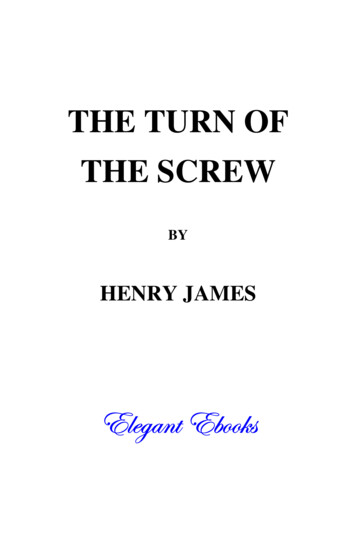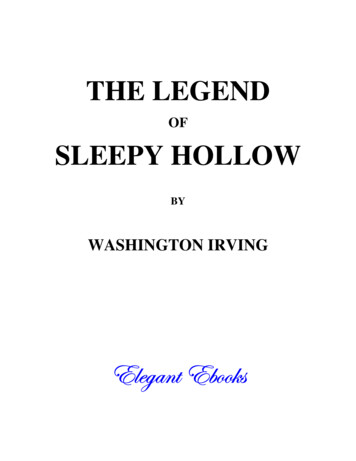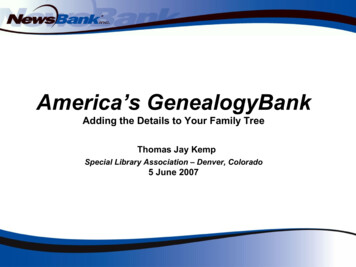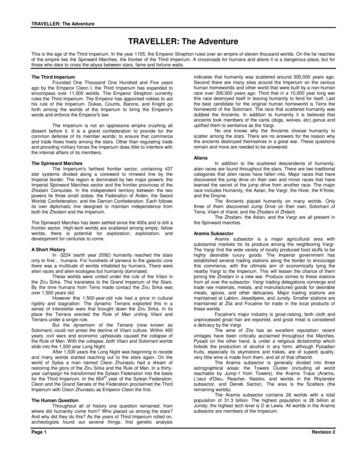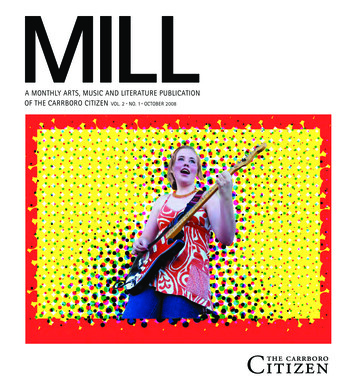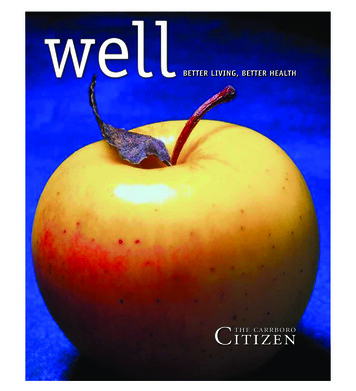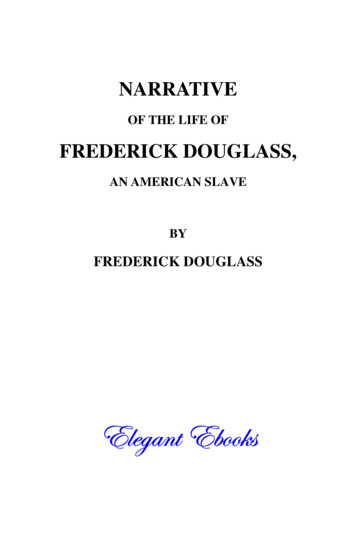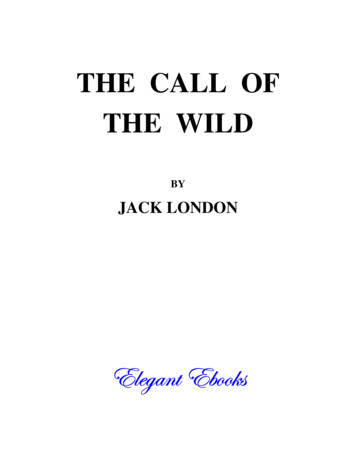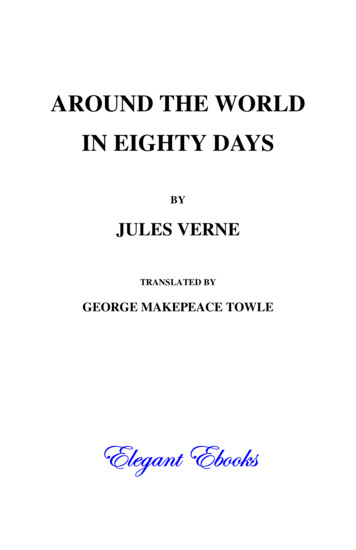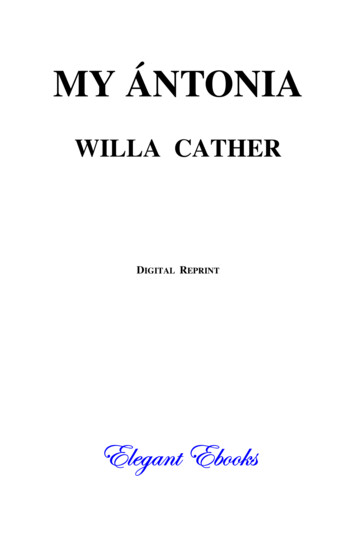
Transcription
MY ÁNTONIAWILLA CATHERDIGITAL REPRINT7 WYS f f 77 T a a ] e
COPYRIGHT INFORMATIONBook: My ÁntoniaAuthor: Willa Sibert Cather, 1873–1947Artist: Wladyslaw Theodor (W. T.) Benda, 1873–1948First published: 1918The text and illustrations of the original book are inthe public domain in the United States. However, sinceCather died in 1947 and Benda in 1948, they may still beunder copyright in many other countries, for example,those that use the life of the author 60 years or life 70years for the duration of copyright. Readers outside theUnited States should check their own countries’ copyrightlaws to be certain they can legally download this ebook.The Online Books Page has an FAQ which gives asummary of copyright durations for many other countries,as well as links to more official sources.This PDF ebook wascreated by José Menéndez.NOTE ON THE TEXTThe text and illustrations used in this ebook are fromthe 1918 first edition. (Thanks to Jon Noring for makinghis page scans available online.) A number of typographicalerrors in the original book have been corrected, but topreserve all of the first edition, the original misprints areincluded in footnotes. The line breaks and pagination ofthe original book have also been reproduced.In addition, a few endnotes (signed “J.M.”) havebeen added to point out some non-typographical mistakesin the text.
MY ÁNTONIABYWILLA SIBERT CATHEROptima dies . . . prima fugitVIRGILWITH ILLUSTRATIONS BYW. T. BENDABOSTON AND NEW YORKHOUGHTON MIFFLIN COMPANY
COPYRIGHT, 1918, BY WILLA SIBERT CATHERALL RIGHTS RESERVEDPublished October 1918
TOCARRIE AND IRENE MINERIn memory of affections old and true
CONTENTSBOOK I. . . .BOOK IITHE HIRED GIRLS . . . . 163BOOK III. . . . 291BOOK IVTHE PIONEER WOMAN’S STORY . 335. 369THE SHIMERDASLENA LINGARDCUZAK’S BOYSBOOK V. . . .3
INTRODUCTIONLAST summer I happened to be crossing theplains of Iowa in a season of intense heat, and itwas my good fortune to have for a travelingcompanion James Quayle Burden — Jim Burden, as we still call him in the West. He and I areold friends — we grew up together in the sameNebraska town — and we had much to say toeach other. While the train flashed throughnever-ending miles of ripe wheat, by countrytowns and bright-flowered pastures and oakgroves wilting in the sun, we sat in the observation car, where the woodwork was hot to thetouch and red dust lay deep over everything.The dust and heat, the burning wind, remindedus of many things. We were talking about whatit is like to spend one’s childhood in little townslike these, buried in wheat and corn, under stimulating extremes of climate: burning summerswhen the world lies green and billowy beneatha brilliant sky, when one is fairly stifled in vegetation, in the color and smell of strong weedsand heavy harvests; blustery winters with littlesnow, when the whole country is stripped bareand gray as sheet-iron. We agreed that no onewho had not grown up in a little prairie townix
MY ANTONIAcould know anything about it. It was a kind offreemasonry, we said.Although Jim Burden and I both live in NewYork, and are old friends, I do not see much ofhim there. He is legal counsel for one of thegreat Western railways, and is sometimes awayfrom his New York office for weeks together.That is one reason why we do not often meet.Another is that I do not like his wife.When Jim was still an obscure young lawyer,struggling to make his way in New York, hiscareer was suddenly advanced by a brilliantmarriage. Genevieve Whitney was the onlydaughter of a distinguished man. Her marriagewith young Burden was the subject of sharpcomment at the time. It was said she had beenbrutally jilted by her cousin, Rutland Whitney,and that she married this unknown man fromthe West out of bravado. She was a restless,headstrong girl, even then, who liked to astonish her friends. Later, when I knew her, she wasalways doing something unexpected. She gaveone of her town houses for a Suffrage headquarters, produced one of her own plays at thePrincess Theater, was arrested for picketingduring a garment-makers’ strike, etc. I amnever able to believe that she has much feelingfor the causes to which she lends her name andher fleeting interest. She is handsome, energetic,x
MY ANTONIAexecutive, but to me she seems unimpressionableand temperamentally incapable of enthusiasm.Her husband’s quiet tastes irritate her, I think,and she finds it worth while to play the patronessto a group of young poets and painters of advanced ideas and mediocre ability. She hasher own fortune and lives her own life. For somereason, she wishes to remain Mrs. James Burden.As for Jim, no disappointments have beensevere enough to chill his naturally romanticand ardent disposition. This disposition, thoughit often made him seem very funny when he wasa boy, has been one of the strongest elements inhis success. He loves with a personal passionthe great country through which his railwayruns and branches. His faith in it and his knowledge of it have played an important part in itsdevelopment. He is always able to raise capital for new enterprises in Wyoming or Montana, and has helped young men out there todo remarkable things in mines and timber andoil. If a young man with an idea can once getJim Burden’s attention, can manage to accompany him when he goes off into the wilds hunting for lost parks or exploring new canyons, thenthe money which means action is usually forthcoming. Jim is still able to lose himself in thosebig Western dreams. Though he is over fortynow, he meets new people and new enterprisesxi
MY ANTONIAwith the impulsiveness by which his boyhoodfriends remember him. He never seems to meto grow older. His fresh color and sandy hairand quick-changing blue eyes are those of ayoung man, and his sympathetic, solicitous interest in women is as youthful as it is Westernand American.During that burning day when we were crossing Iowa, our talk kept returning to a centralfigure, a Bohemian girl whom we had known longago and whom both of us admired. More thanany other person we remembered, this girl seemedto mean to us the country, the conditions, thewhole adventure of our childhood. To speak hername was to call up pictures of people andplaces, to set a quiet drama going in one’s brain.I had lost sight of her altogether, but Jim hadfound her again after long years, had renewed afriendship that meant a great deal to him, andout of his busy life had set apart time enough toenjoy that friendship. His mind was full of herthat day. He made me see her again, feel herpresence, revived all my old affection for her.“I can’t see,” he said impetuously, “why youhave never written anything about Ántonia.”I told him I had always felt that other people— he himself, for one — knew her much betterthan I. I was ready, however, to make an agreement with him; I would set down on paper allxii
MY ANTONIAthat I remembered of Ántonia if he would dothe same. We might, in this way, get a pictureof her.He rumpled his hair with a quick, excitedgesture, which with him often announces a newdetermination, and I could see that my suggestion took hold of him. “Maybe I will, maybe Iwill!” he declared. He stared out of the windowfor a few moments, and when he turned to meagain his eyes had the sudden clearness thatcomes from something the mind itself sees. “Ofcourse,” he said, “I should have to do it in adirect way, and say a great deal about myself.It’s through myself that I knew and felt her,and I’ve had no practice in any other form ofpresentation.”I told him that how he knew her and felt herwas exactly what I most wanted to know aboutÁntonia. He had had opportunities that I, as alittle girl who watched her come and go, had not.Months afterward Jim Burden arrived at myapartment one stormy winter afternoon, with abulging legal portfolio sheltered under his furovercoat. He brought it into the sitting-roomwith him and tapped it with some pride as hestood warming his hands.“I finished it last night — the thing aboutÁntonia,” he said. “Now, what about yours?”xiii
MY ANTONIAI had to confess that mine had not gone beyond a few straggling notes.“Notes? I did n’t make any.” He drank histea all at once and put down the cup. “I did n’tarrange or rearrange. I simply wrote downwhat of herself and myself and other peopleÁntonia’s name recalls to me. I suppose it has n’tany form. It has n’t any title, either.” He wentinto the next room, sat down at my desk andwrote on the pinkish face of the portfolio theword, “Ántonia.” He frowned at this a moment,then prefixed another word, making it “MyÁntonia.” That seemed to satisfy him.“Read it as soon as you can,” he said, rising,“but don’t let it influence your own story.”My own story was never written, but the following narrative is Jim’s manuscript, substantially as he brought it to me.
MY ÁNTONIABOOK ITHE SHIMERDASII FIRST heard of Ántonia 1 on what seemedto me an interminable journey across thegreat midland plain of North America. I wasten years old then; I had lost both my fatherand mother within a year, and my Virginiarelatives were sending me out to my grandparents, who lived in Nebraska. I traveledin the care of a mountain boy, Jake Marpole,one of the “hands” on my father’s old farmunder the Blue Ridge, who was now goingWest to work for my grandfather. Jake’s experience of the world was not much wider thanmine. He had never been in a railway trainuntil the morning when we set out togetherto try our fortunes in a new world.¹ The Bohemian name Ántonia is strongly accented onthe first syllable, like the English name Anthony, and thei is, of course, given the sound of long e. The name ispronounced An -ton-ee-ah.3
MY ANTONIAWe went all the way in day-coaches, becoming more sticky and grimy with each stageof the journey. Jake bought everything thenewsboys offered him: candy, oranges, brasscollar buttons, a watch-charm, and for me a“Life of Jesse James,” which I remember asone of the most satisfactory books I haveever read. Beyond Chicago we were under theprotection of a friendly passenger conductor,who knew all about the country to whichwe were going and gave us a great deal ofadvice in exchange for our confidence. Heseemed to us an experienced and worldly manwho had been almost everywhere; in his conversation he threw out lightly the names of distant States and cities. He wore the rings andpins and badges of different fraternal ordersto which he belonged. Even his cuff-buttonswere engraved with hieroglyphics, and he wasmore inscribed than an Egyptian obelisk.Once when he sat down to chat, he told usthat in the immigrant car ahead there was afamily from “across the water” whose destination was the same as ours.“They can’t any of them speak English,except one little girl, and all she can say is‘We go Black Hawk, Nebraska.’ She’s a not4aShe ’s
THE SHIMERDASmuch older than you, twelve or thirteen,maybe, and she’s a as bright as a new dollar.Don’t you want to go ahead and see her,Jimmy? She’s b got the pretty brown eyes,too!”This last remark made me bashful, and Ishook my head and settled down to “JesseJames.” Jake nodded at me approvingly andsaid you were likely to get diseases from foreigners.I do not remember crossing the MissouriRiver, or anything about the long day’s journey through Nebraska. Probably by thattime I had crossed so many rivers that Iwas dull to them. The only thing very noticeable about Nebraska was that it was still,all day long, Nebraska.I had been sleeping, curled up in a red plushseat, for a long while when we reached BlackHawk. Jake roused me and took me by thehand. We stumbled down from the train toa wooden siding, where men were runningabout with lanterns. I could n’t see any town,or even distant lights; we were surroundedby utter darkness. The engine was pantingheavily after its long run. In the red glowfrom the fire-box, a group of people stood hud5ashe ’sbShe ’s
MY ANTONIAdled together on the platform, encumbered bybundles and boxes. I knew this must be theimmigrant family the conductor had told usabout. The woman wore a fringed shawl tiedover her head, and she carried a little tintrunk in her arms, hugging it as if it were ababy. There was an old man, tall and stooped.Two half-grown boys and a girl stood holdingoilcloth a bundles, and a little girl clung toher mother’s skirts. Presently a man with alantern approached them and began to talk,shouting and exclaiming. I pricked up myears, for it was positively the first time I hadever heard a foreign tongue.Another lantern came along. A banteringvoice called out: “Hello, are you Mr. Burden’s folks? If you are, it’s b me you’re c lookingfor. I’m d Otto Fuchs. I’m e Mr. Burden’shired man, and I’m f to drive you out. Hello,Jimmy, ain’t you scared to come so far west?”I looked up with interest at the new facein the lantern light. He might have steppedout of the pages of “Jesse James.” He worea sombrero hat, with a wide leather band anda bright buckle, and the ends of his mustachewere twisted up stiffly, like little horns. Helooked lively and ferocious, I thought, and6aoil-clothbit ’scyou ’redI ’meI ’mfI ’m
THE SHIMERDASas if he had a history. A long scar ran acrossone cheek and drew the corner of his mouthup in a sinister curl. The top of his left earwas gone, and his skin was brown as an Indian’s. Surely this was the face of a desperado. As he walked about the platform in hishigh-heeled boots, looking for our trunks, Isaw that he was a rather slight man, quickand wiry, and light on his feet. He told uswe had a long night drive ahead of us, andhad better be on the hike. He led us to ahitching-bar where two farm wagons weretied, and I saw the foreign family crowdinginto one of them. The other was for us. Jakegot on the front seat with Otto Fuchs, and Irode on the straw in the bottom of the wagonbox, covered up with a buffalo hide. The immigrants rumbled off into the empty darkness, and we followed them.I tried to go to sleep, but the jolting mademe bite my tongue, and I soon began to acheall over. When the straw settled down I hada hard bed. Cautiously I slipped from underthe buffalo hide, got up on my knees andpeered over the side of the wagon. Thereseemed to be nothing to see; no fences, nocreeks or trees, no hills or fields. If there was7
MY ANTONIAa road, I could not make it out in the faintstarlight. There was nothing but land: not acountry at all, but the material out of whichcountries are made. No, there was nothingbut land — slightly undulating, I knew, because often our wheels ground against thebrake as we went down into a hollow andlurched up again on the other side. I had thefeeling that the world was left behind, thatwe had got over the edge of it, and were outside man’s jurisdiction. I had never beforelooked up at the sky when there was not afamiliar mountain ridge against it. But thiswas the complete dome of heaven, all therewas of it. I did not believe that my deadfather and mother were watching me fromup there; they would still be looking for meat the sheep-fold down by the creek, or alongthe white road that led to the mountain pastures. I had left even their spirits behindme. The wagon jolted on, carrying me Iknew not whither. I don’t think I was homesick. If we never arrived anywhere, it did notmatter. Between that earth and that sky Ifelt erased, blotted out. I did not say myprayers that night: here, I felt, what wouldbe would be.
III DO not remember our arrival at my grandfather’s farm sometime before daybreak, aftera drive of nearly twenty miles with heavywork-horses. When I awoke, it was afternoon. I was lying in a little room, scarcelylarger than the bed that held me, and thewindow-shade at my head was flapping softlyin a warm wind. A tall woman, with wrinkledbrown skin and black hair, stood looking downat me; I knew that she must be my grandmother. She had been crying, I could see, butwhen I opened my eyes she smiled, peered at meanxiously, and sat down on the foot of my bed.“Had a good sleep, Jimmy?” she askedbriskly. Then in a very different tone she said,as if to herself, “My, how you do look likeyour father!” I remembered that my fatherhad been her little boy; she must often havecome to wake him like this when he overslept.“Here are your clean clothes,” she went on,stroking my coverlid with her brown hand asshe talked. “But first you come down to thekitchen with me, and have a nice warm bath9
MY ANTONIAbehind the stove. Bring your things; there’s anobody about.”“Down to the kitchen” struck me as curious; it was always “out in the kitchen” athome. I picked up my shoes and stockingsand followed her through the living-room anddown a flight of stairs into a basement. Thisbasement was divided into a dining-room atthe right of the stairs and a kitchen at the left.Both rooms were plastered and whitewashed— the plaster laid directly upon the earthwalls, as it used to be in dugouts. The floorwas of hard cement. Up under the woodenceiling there were little half-windows withwhite curtains, and pots of geraniums andwandering Jew in the deep sills. As I enteredthe kitchen I sniffed a pleasant smell of gingerbread baking. The stove was very large,with bright nickel trimmings, and behind itthere was a long wooden bench against thewall, and a tin washtub, into which grandmother poured hot and cold water. When shebrought the soap and towels, I told her thatI was used to taking my bath without help.“Can you do your ears, Jimmy? Are yousure? Well, now, I call you a right smart littleboy.”10athere ’s
THE SHIMERDASIt was pleasant there in the kitchen. Thesun shone into my bath-water through thewest half-window, and a big Maltese cat cameup and rubbed himself against the tub, watching me curiously. While I scrubbed, my grandmother busied herself in the dining-room untilI called anxiously, “Grandmother, I’m afraidthe cakes are burning!” Then she came laughing, waving her apron before her as if she wereshooing chickens.She was a spare, tall woman, a little stooped,and she was apt to carry her head thrust forward in an attitude of attention, as if she werelooking at something, or listening to something, far away. As I grew older, I came tobelieve that it was only because she was sooften thinking of things that were far away.She was quick-footed and energetic in all hermovements. Her voice was high and rathershrill, and she often spoke with an anxious inflection, for she was exceedingly desirous thateverything should go with due order and decorum. Her laugh, too, was high, and perhapsa little strident, but there was a lively intelligence in it. She was then fifty-five years old,a strong woman, of unusual endurance.After I was dressed I explored the long cellar11
MY ANTONIAnext the kitchen. It was dug out under thewing of the house, was plastered and cemented, with a stairway and an outside doorby which the men came and went. Under oneof the windows there was a place for them towash when they came in from work.While my grandmother was busy aboutsupper I settled myself on the wooden benchbehind the stove and got acquainted with thecat — he caught not only rats and mice, butgophers, I was told. The patch of yellow sunlight on the floor traveled back toward thestairway, and grandmother and I talked aboutmy journey, and about the arrival of the newBohemian family; she said they were to beour nearest neighbors. We did not talk aboutthe farm in Virginia, which had been her homefor so many years. But after the men camein from the fields, and we were all seated atthe supper-table, then she asked Jake aboutthe old place and about our friends and neighbors there.My grandfather said little. When he firstcame in he kissed me and spoke kindly to me,but he was not demonstrative. I felt at oncehis deliberateness and personal dignity, andwas a little in awe of him. The thing one im12
THE SHIMERDASmediately noticed about him was his beautiful, crinkly, snow-white beard. I once heard amissionary say it was like the beard of anArabian sheik. His bald crown only made itmore impressive.Grandfather’s eyes were not at all like thoseof an old man; they were bright blue, andhad a fresh, frosty sparkle. His teeth werewhite and regular — so sound that he hadnever been to a dentist in his life. He hada delicate skin, easily roughened by sun andwind. When he was a young man his hairand beard were red; his eyebrows were stillcoppery.As we sat at the table Otto Fuchs and I keptstealing covert glances at each other. Grandmother had told me while she was getting supper that he was an Austrian who came to thiscountry a young boy and had led an adventurous life in the Far West among miningcamps and cow outfits. His iron constitutionwas somewhat broken by mountain pneumonia, and he had drifted back to live in amilder country for a while. He had relativesin Bismarck, a German settlement to thenorth of us, but for a year now he had beenworking for grandfather.13
MY ANTONIAThe minute supper was over, Otto took meinto the kitchen to whisper to me about apony down in the barn that had been boughtfor me at a sale; he had been riding him to findout whether he had any bad tricks, but he wasa “perfect gentleman,” and his name wasDude. Fuchs told me everything I wantedto know: how he had lost his ear in a Wyomingblizzard when he was a stage-driver, and howto throw a lasso. He promised to rope a steerfor me before sundown next day. He got outhis “chaps” and silver spurs to show them toJake and me, and his best cowboy boots, withtops stitched in bold design — roses, and truelover’s knots, and undraped female figures.These, he solemnly explained, were angels.Before we went to bed Jake and Otto werecalled up to the living-room for prayers.Grandfather put on silver-rimmed spectaclesand read several Psalms. His voice was sosympathetic and he read so interestingly thatI wished he had chosen one of my favoritechapters in the Book of Kings. I was awedby his intonation of the word “Selah.” “Heshall choose our inheritance for us, the excellencyof Jacob whom He loved. Selah.” I had no ideawhat the word meant; perhaps he had not.14
THE SHIMERDASBut, as he uttered it, it became oracular, themost sacred of words.Early the next morning I ran out of doorsto look about me. I had been told that ourswas the only wooden house west of BlackHawk — until you came to the Norwegiansettlement, where there were several. Ourneighbors lived in sod houses and dugouts —comfortable, but not very roomy. Our whiteframe house, with a story and half-story abovethe basement, stood at the east end of what Imight call the farmyard, with the windmillclose by the kitchen door. From the windmillthe ground sloped westward, down to thebarns and granaries and pig-yards. This slopewas trampled hard and bare, and washed outin winding gullies by the rain. Beyond thecorncribs, at the bottom of the shallow draw,was a muddy little pond, with rusty willowbushes growing about it. The road from thepost-office came directly by our door, crossedthe farmyard, and curved round this littlepond, beyond which it began to climb thegentle swell of unbroken prairie to the west.There, along the western sky-line, it skirted agreat cornfield, much larger than any field Ihad ever seen. This cornfield, and the sor15
MY ANTONIAghum patch behind the barn, were the onlybroken land in sight. Everywhere, as far asthe eye could reach, there was nothing butrough, shaggy, red grass, most of it as tall as I.North of the house, inside the ploughed firebreaks, grew a thick-set strip of box-eldertrees, low and bushy, their leaves alreadyturning yellow. This hedge was nearly aquarter of a mile long, but I had to look veryhard to see it at all. The little trees were insignificant against the grass. It seemed as ifthe grass were about to run over them, andover the plum-patch behind the sod chickenhouse.As I looked about me I felt that the grasswas the country, as the water is the sea. Thered of the grass made all the great prairie thecolor of wine-stains, or of certain seaweedswhen they are first washed up. And there wasso much motion in it; the whole countryseemed, somehow, to be running.I had almost forgotten that I had a grandmother, when she came out, her sunbonnet onher head, a grain-sack in her hand, and askedme if I did not want to go to the garden withher to dig potatoes for dinner. The garden,curiously enough, was a quarter of a mile from16
THE SHIMERDASthe house, and the way to it led up a shallowdraw past the cattle corral. Grandmothercalled my attention to a stout hickory cane,tipped with copper, which hung by a leatherthong from her belt. This, she said, was herrattlesnake cane. I must never go to the garden without a heavy stick or a corn-knife; shehad killed a good many rattlers on her wayback and forth. A little girl who lived on theBlack Hawk road was bitten on the ankleand had been sick all summer.I can remember exactly how the countrylooked to me as I walked beside my grandmother along the faint wagon-tracks on thatearly September morning. Perhaps the glideof long railway travel was still with me, formore than anything else I felt motion in thelandscape; in the fresh, easy-blowing morningwind, and in the earth itself, as if the shaggygrass were a sort of loose hide, and underneathit herds of wild buffalo were galloping, galloping . . .Alone, I should never have found the garden— except, perhaps, for the big yellow pumpkinsthat lay about unprotected by their witheringvines — and I felt very little interest in it whenI got there. I wanted to walk straight on17
MY ANTONIAthrough the red grass and over the edge ofthe world, which could not be very far away.The light air about me told me that theworld ended here: only the ground and sunand sky were left, and if one went a littlefarther there would be only sun and sky, andone would float off into them, like the tawnyhawks which sailed over our heads makingslow shadows on the grass. While grandmothertook the pitchfork we found standing in oneof the rows and dug potatoes, while I pickedthem up out of the soft brown earth and putthem into the bag, I kept looking up at thehawks that were doing what I might so easilydo.When grandmother was ready to go, I saidI would like to stay up there in the gardenawhile.She peered down at me from under her sunbonnet. “Are n’t you afraid of snakes?”“A little,” I admitted, “but I’d like to stayanyhow.”“Well, if you see one, don’t have anythingto do with him. The big yellow and brownones won’t hurt you; they’re bull-snakes andhelp to keep the gophers down. Don’t bescared if you see anything look out of that18
THE SHIMERDAShole in the bank over there. That’s a badgerhole. He’s about as big as a big ’possum, andhis face is striped, black and white. He takesa chicken once in a while, but I won’t let themen harm him. In a new country a body feelsfriendly to the animals. I like to have himcome out and watch me when I’m at work.”Grandmother swung the bag of potatoesover her shoulder and went down the path,leaning forward a little. The road followedthe windings of the draw; when she came tothe first bend she waved at me and disappeared. I was left alone with this new feelingof lightness and content.I sat down in the middle of the garden,where snakes could scarcely approach unseen,and leaned my back against a warm yellowpumpkin. There were some ground-cherrybushes growing along the furrows, full of fruit.I turned back the papery triangular sheathsthat protected the berries and ate a few. Allabout me giant grasshoppers, twice as big asany I had ever seen, were doing acrobaticfeats among the dried vines. The gophersscurried up and down the ploughed ground.There in the sheltered draw-bottom the winddid not blow very hard, but I could hear it19
MY ANTONIAsinging its humming tune up on the level, andI could see the tall grasses wave. The earthwas warm under me, and warm as I crumbledit through my fingers. Queer little red bugscame out and moved in slow squadrons aroundme. Their backs were polished vermilion,with black spots. I kept as still as I could.Nothing happened. I did not expect anything to happen. I was something that layunder the sun and felt it, like the pumpkins,and I did not want to be anything more. Iwas entirely happy. Perhaps we feel like thatwhen we die and become a part of somethingentire, whether it is sun and air, or goodnessand knowledge. At any rate, that is happiness; to be dissolved into something completeand great. When it comes to one, it comes asnaturally as sleep.
IIION Sunday morning Otto Fuchs was to driveus over to make the acquaintance of our newBohemian neighbors. We were taking themsome provisions, as they had come to live ona wild place where there was no garden orchicken-house, and very little broken land.Fuchs brought up a sack of potatoes and apiece of cured pork from the cellar, andgrandmother packed some loaves of Saturday’s bread, a jar of butter, and severalpumpkin pies in the straw of the wagon-box.We clambered up to the front seat and joltedoff past the little pond and along the roadthat climbed to the big cornfield.I could hardly wait to see what lay beyondthat cornfield; but there was only red grasslike ours, and nothing else, though from thehigh wagon-seat one could look off a long way.The road ran about like a wild thing, avoidingthe deep draws, crossing them where theywere wide and shallow. And all along it, wherever it looped or ran, the sunflowers grew;some of them were as big as little trees, with21
MY ANTONIAgreat rough leaves and many branches whichbore dozens of blossoms. They made a goldribbon across the prairie. Occasionally one ofthe horses would tear off with his teeth a plantfull of blossoms, and walk along munching it,the flowers nodding in time to his bites as heate down toward them.The Bohemian family, grandmother toldme as we drove along, had bought the homestead of a fellow-countryman, Peter Krajiek,and had paid him
The Online Books Page has an FAQ which gives a summary of copyright durations for many other countries, as well as links to more official sources. This PDF ebook was created by José Menéndez. NOTE ON THE TEXT The text and illustrations used in this ebook are from
